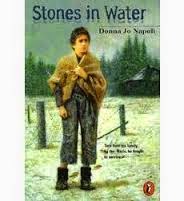Book Review: Stones in Water
"All you need is stones. If you have enough stones, and the water is shallow enough, you can build a city up through the waves. Like Venice."
We (using the royal we here) are reading too much right now. But, this book is one of those ones that I am not ashamed of having read. And I would hope others would read it too, because it is a gem of children's literature.
With that introduction, I present Stones in Water. Roberto (twelve or thirteen), his older brother Sergio, and his two friends Memo and Samuele are just planning to catch a movie in Venice, walking there from their small town outside of Venice. But when Nazis raid the theatre, they become part of a forgotten class of Hitler's victims--Italian teenage boys abducted for manual labor. If they faint, they are shot. If they rest too long, they are shot. And they are split up by Italian city state so that they can't even really communicate with one another to coordinate any kind of rebellion--their dialects are only similar enough to get by on a day-to-day.
Roberto's struggle to remember who he is and where he comes from, as well as get back to where he came from is heart-breaking and insightful. The writing in the beginning comes off as very prosaic, like the author wasn't really sure what she was trying to do. But by the end, the themes and ideas come together into a cohesive structure. Each character is enigmatic and hard to grasp--from the German guard the boys call Wasser, to Roberto's Jewish friend Samuele (who they decide to call Enzo for obvious reasons)-- but in such a life-like way. The story is meticulously researched, and apparently, loosely-based on the memories of an actual survivor.
There will be discussion of male anatomy--as it becomes rather important when you're desperately trying to hide the fact that someone is Jewish from the rest of a labor camp of teenage boys.
I spent a long time trying to figure out the title. It just sounded like a euphemism for kidney stones for a long time. Stones are important throughout the story, but I wasn't sure why they were in water until the last page. Then it all made sense. So just be patient.
When I was assigning stars to this one, I kept on saying four in my mind. But I could never find a reason why. Then I realized that I was comparing it to Number the Stars, which, let's be honest, isn't really fair. Number the Stars is the masterpiece of all Children's Holocaust books. So, 5 stars, but not a Number the Stars 5 stars.



Comments